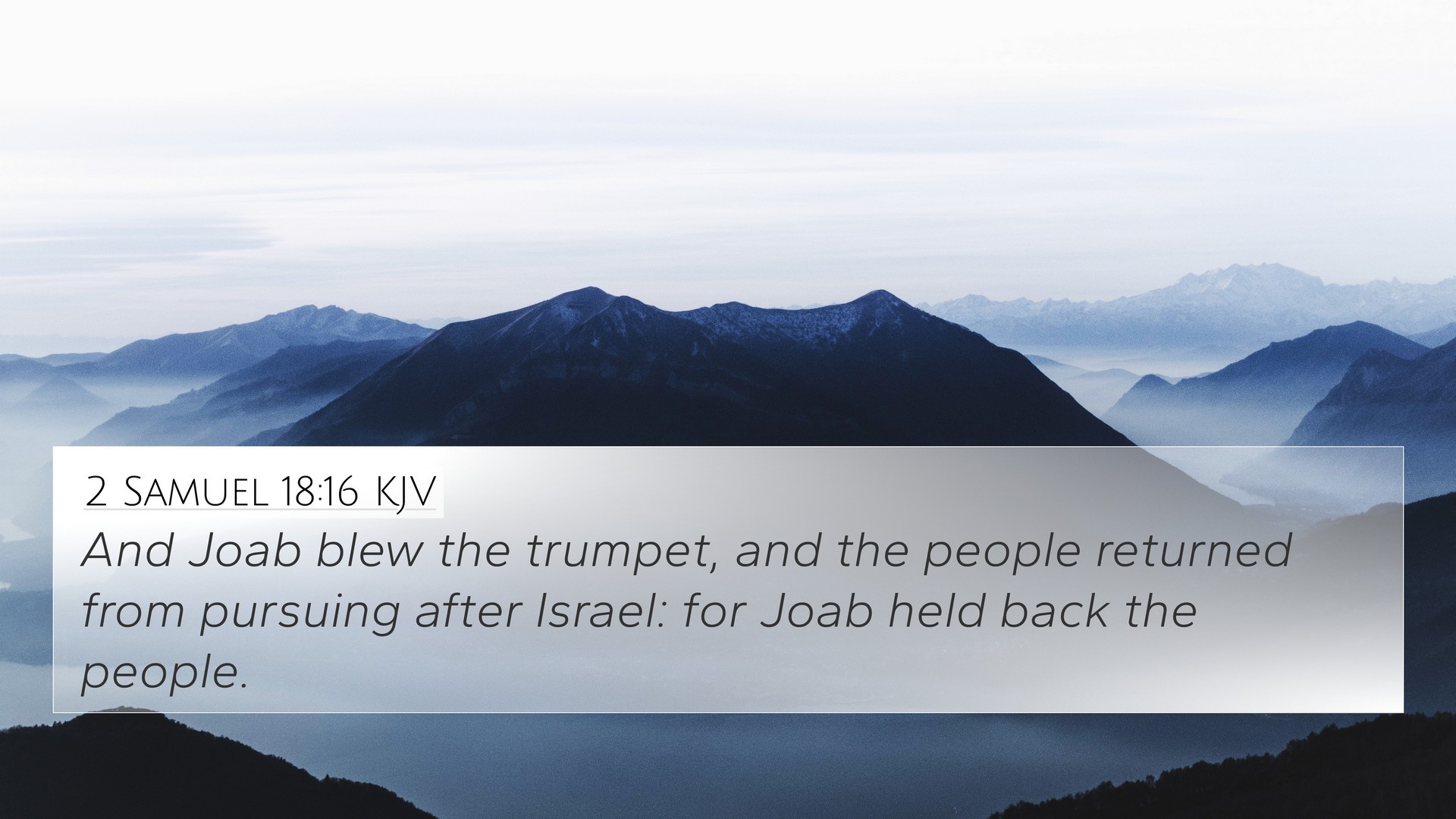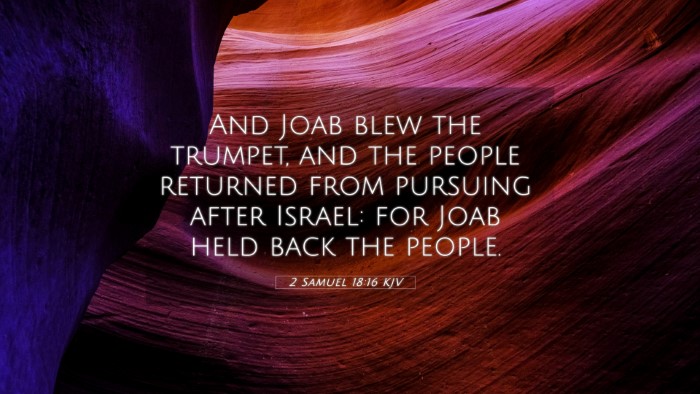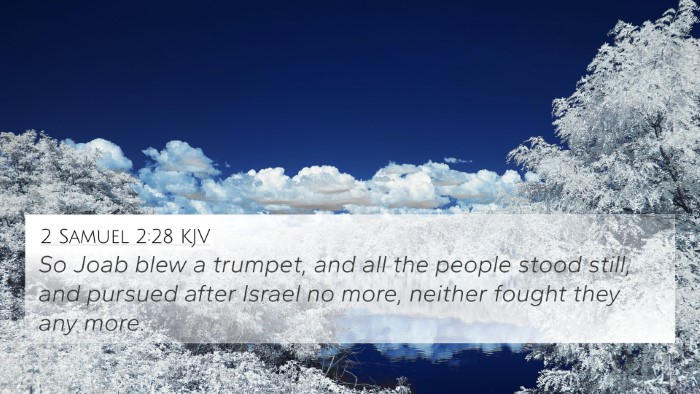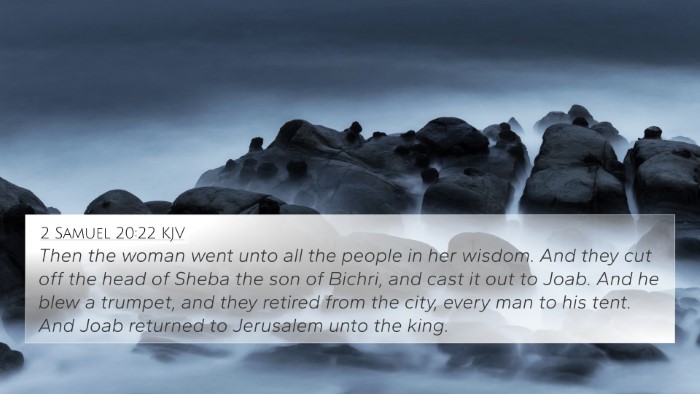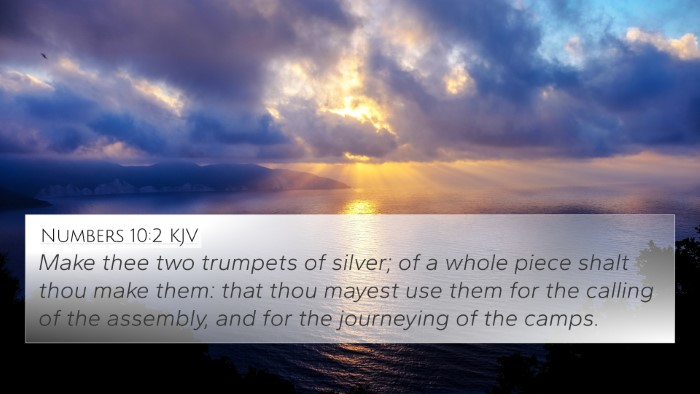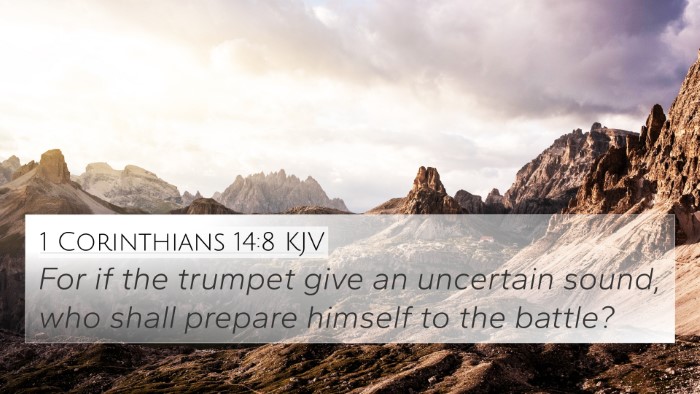Understanding 2 Samuel 18:16
Bible Verse: 2 Samuel 18:16
This pivotal verse in the book of 2 Samuel narrates a moment during Absalom's rebellion against his father, King David. The verse reads:
"And Joab blew the trumpet, and the people returned from pursuing after Israel; for Joab held back the people."
Summary of Meaning
This verse encapsulates a decisive moment in the conflict between David's loyalists and Absalom's rebel forces. The blowing of the trumpet signifies a command to cease hostilities, suggesting the intervention of leadership in preventing further bloodshed.
Commentary Insights
Matthew Henry's Commentary
Matthew Henry emphasizes Joab's role as a military leader and the authority inherent in his actions. Joab's decision to blow the trumpet reflects not only his tactical skill but also his commitment to protecting David's kingdom from unnecessary devastation. Henry suggests that this act serves to maintain order amidst chaos, reinforcing the idea that true leadership involves restraint and strategic decision-making.
Albert Barnes' Commentary
Albert Barnes points out that Joab's action to blow the trumpet acted as a rallying point for the troops. It represents a pivotal moment where the narrative shifts from conflict to resolution. Barnes highlights that Joab's leadership is crucial, as it reassures David's supporters and indicates that the rebellion against him is effectively quelled. This transition is critical for the stability of David’s reign going forward.
Adam Clarke's Commentary
Adam Clarke comments on the significance of the trumpet in ancient Israel’s military context. It served as a signal of command and control, and in this instance, it symbolizes the cessation of hostilities. Clarke suggests that Joab’s restrained approach in this moment signifies a strategic decision to prioritize the preservation of life over victory at all costs. This serves as a lesson in wisdom and prudence in leadership.
Bible Verse Cross-References
- 1 Samuel 13:3: Relating to the significance of military commands and their impact on Israel's kingship.
- 2 Samuel 15:1-6: The context of Absalom's uprising and the challenges David faced.
- 2 Samuel 19:1-8: A parallel reflection on Joab’s actions post-conflict and loyalty to David.
- Ecclesiastes 3:8: Emphasizing the time for war and a time for peace, pertinent to the cessation of hostilities here.
- Isaiah 40:28-31: Connecting the themes of strength and intervention in times of conflict.
- Proverbs 20:18: The necessity of counsel in planning military endeavors.
- Psalm 76:10: A testament to God controlling the outcomes of conflicts.
Thematic Connections
The broader themes in 2 Samuel 18:16 resonate throughout Scripture, highlighting issues of leadership, duty, and the moral implications of warfare. Joab’s intervention serves as a thematic anchor for exploring the balance between conflict and compassion. The Bible often draws connections between passages that underline these principles, reinforcing the importance of wise leadership in all endeavors.
Inter-Biblical Dialogue
This verse facilitates insightful examination into the fabric of biblical leadership and conflict resolution, as seen across both Old and New Testaments. The events underscore a reoccurring biblical principle: the need for decisive leadership in turbulent times. By engaging in comparative Bible verse analysis, we can identify how similar themes are echoed within various contexts throughout the Scriptures.
How to Use Cross References
Understanding the significance of cross-referencing biblical texts can enrich one's study of specific verses. Here are some tools for Bible cross-referencing:
- Bible Concordance: It can help locate specific themes and words across scripture.
- Bible Cross-Reference Guide: Resources available to identify connections between verses.
- Cross-Reference Bible Study: Methods to analyze the connections between scriptures in-depth.
- Comprehensive Bible Cross-Reference Materials: To expand one’s understanding of interconnected themes.
Conclusion
2 Samuel 18:16 illustrates the critical junction in David’s journey as a king and the complexities of familial and national conflict. By exploring related verses and overarching themes, individuals can dive deeper into the nature of leadership and conflict resolution as presented in the Bible.
